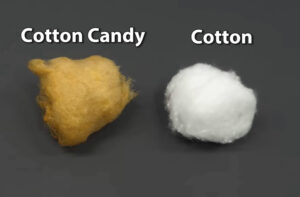Turning Cotton Balls into
Cotton Candy
By Daniel Cruz
ENGL- 21007
Abstract
Cotton balls are made up of cellulose and cellulose is made up of glucose which is sugar.
The hypothesis is that it is possible to make cotton candy from cotton balls. Nile adds the cotton
balls into sulfuric acid which separates cellulose into smaller parts then breaks them down into
glucose. Through a few trials Nile gets the sugar to crystallize which then allows him to make
the cotton candy. Nile faced a few problems along the way, but he improvised and thought of
solutions. The results were not as expected but the goal was accomplished.
Introduction
Cotton balls are made up of a material called cellulose and cellulose is a chain of glucose
molecules. Knowing that cotton is technically all sugar it should be possible to break down the
cotton balls to make candy, in this case cotton candy. This experiment was a long dream of
Nile’s which to him sounded ridiculous, but he knew it was possible and it took him a long time
to plan it out. To make it a bit more challenging Nile didn’t want to use specialized equipment
and complex chemicals to make the experiment simple to do.
Materials and Methods
• Sulfuric acid (230g)
• Water
• Reisin
• calcium carbonate (245g)
• Lab utensils (Beakers, filters, stir rod)
The 2 main ingredients we used in this experiment are cotton balls(77g) and sulfuric
acid(230g). We begin this experiment by diluting the acid with ice, because the acid might be too
concentrated and would possibly burn all the cotton balls. Then we put the cotton into the acid
one handful at a time. The cotton begins to dissolve in the acid, but some cotton remains, so we
put the container in a hot water(50c) bath to help dissolve the cotton. We then proceed to dilute
the solution even more by adding it to 456mL of boiling hot water which was a major step to
begin breaking down the cellulose into glucose. Then we cooled down the solution by
surrounding the container with ice. While the solution cools down, we prepared another mixture
needed which is calcium carbonate(chalk). We mix the chalk(245g) with 125mL of water. Once
cooled, slowly add the chalk mixture into the cotton solution. After mixing now we need to filter
out all the sugar water out of it.
The sugar water was full of impurities, side products and acid so we needed to filter it out
again. To filter the water, we used a chemical often used to filter aquarium water called resin.
We put the resin in a tube which would allow the solution to run through while pulling out all the
acid and side products. We did this process twice making the solution purer and a lighter color.
Then we removed a lot of water in the solution by putting it in a dehydrator for about 35 hours.
We noticed the solution still smelled strange and slightly acidic, so we ran it through the filter
add water, so we had to remove it again. And now we waited for it to crystallize.
Results
It did not crystallize, instead it had become gooey which had the texture of melted sugar,
so this meant we are on the right track. We thought of a solution to fix it by putting it on a hot
pan to completely boil all remaining water and to caramelize the sugar. The sugar finally
crystallized which meant it was time to put it in the cotton candy machine. It failed; the sugar we
made had a melting point too low, so it had trouble cooling in the machine giving it its stringy
texture. And once again we came up with another solution of caramelizing the sugar to increase
its melting point. Finally, successfully, the cotton candy he made turned out to be thicker than
the regular kind, came out brown and tasted good yet slightly burned.

Discussion
In this experiment we saw that some steps didn’t go as planned therefore needing to come
up with solutions to fix it. When the solution became gooey it was because there was still water,
so we had to remove it by heating up the solution. In our first attempt of putting the sugar into
the cotton candy machine it failed because the melting point was too low and only made a mess
inside the machine. The sugar would just sling into the sides of the machine so to fix this we
caramelized the sugar to get it to the proper melting point. Although it doesn’t seem like an
overly complicated experiment it did take quite a lot of time to conduct. The results were not as
expected but he did the best with what he had and made his dream of making cotton candy from
cotton balls a reality.
Conclusion
In conclusion, we saw that it is possible to make cotton candy from the glucose molecules
in cotton balls. Although Nile had a plan, we saw that it didn’t go exactly as planned so he had to
improvise and think of solutions to make this experiment succeed. Also, while having limitations
of no fancy equipment or chemicals and just using items anyone can get.
References
Nile. “Turning Cotton Balls into Cotton Candy.” YouTube, 3 Sept. 2021,
youtu.be/vHuFizITMdA?si=Hzn5sCPTBepTGIoA.


